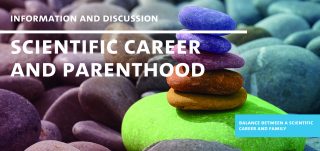After 12 years in science, one has to decide – either for pursuing a career in science or switching into industry, for example. The 12 years, which are divided into the phase as a graduate student and the phase as a postdoc, are regulated in the legal ramifications of limited work contracts (German Wissenschaftszeitvertragsgesetz, WissZeitVG). The law also includes how children and parental leave affect the limitation of a contract. The fifth edition of “Scientific Career and Parenthood” dealt with the legal conditions for a scientific career and the private background, which has to fit as well.
 Professor Jan Louis, Vice President of Universität Hamburg had a clear message to the participants at the event on Campus Bahrenfeld: “Take parental leave,” he said particularly into the direction of fathers. The university virtually demanded this and if there were problems occuring with the supervisors, he would offer help. As a matter of fact the number of fathers who have informed themselves at SCAP has increased over the past years; this time half of the 30 participants were fathers.
Professor Jan Louis, Vice President of Universität Hamburg had a clear message to the participants at the event on Campus Bahrenfeld: “Take parental leave,” he said particularly into the direction of fathers. The university virtually demanded this and if there were problems occuring with the supervisors, he would offer help. As a matter of fact the number of fathers who have informed themselves at SCAP has increased over the past years; this time half of the 30 participants were fathers.
Yet, supervisors are not the only reasons that might hamper the progress. Henning Rockmann, legal adviser and head of the division of the “Hochschulrektorenkonferenz” presented the “Wissenschaftszeitvertragsgesetz” and the Tenure Track Program. Particularly, the Tenure Track Program for the support of young researchers should make career paths in academia more predictable and transparent. The federal government will provide 1 billion euros until 2031 in order to support an extra of 1,000 Tenure Track professorships. Rockmann does not consider this sufficient, as there are only 1,000 open professorships in Germany annually.
Various questions following Rockmann’s talk underlined how difficult it is to understand the arrangements. Irina Haan, deputy team leader in HR services at Universität Hamburg answered questions after the speech. However, in the area of natural science with different promotion regulations, various third-party funded projects and international career paths details matter.
The three guests, who sat down on the podium after the speech, have long found their academic career path at Universität Hamburg. Prof. Katrin Dausmann conducts research at the Institute of Zoology, Dr. Maria Riedner works at the Institute of Organic Chemistry and Dr. Juan Miguel Rodríguez López is both, a teacher and a postdoc at The Center for Earth System Research and Sustainability (CEN). Each of them has children and agrees that Hamburg and the university offer good conditions to manage career and family life – in case you are efficient, flexible and can rely on a good network. “It is great, how SCAP has developed into an established platform for open and honest exchange that highlights the manifold strategies of reconciling management of structural conditions, legal foundations and private arrangement,” Marie Lutz, equal opportunity officer at CUI, stated.
The event is hosted by the Clusters of Excellence CliSAP and CUI, the Collaborative Research Center “Particles, Strings and the Early Universe” (SFB 676), and the Faculty of Mathematics, Informatics and Natural Sciences – in cooperation with the Family Office of Universität Hamburg.
Links to Federal Ministry of Educazion and Research:
Karrierewege für den wissenschaftlichen Nachwuchs an Hochschulen verbessern

